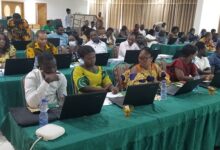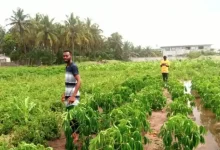
Food insecurity has worsened among the Ghanaian population, a survey by the Ghana Statistical Service (GSS) and the Ministry of Food and Agriculture (MOFA), has revealed.
A person is food insecure when the person lacks regular access to enough safe, nutritious food for normal growth and development, and an active healthy life.
According to the survey dubbed “2020Comprehensive Food Security and Vulnerability Analysis (CFSVA),” such persons increased from 1.2 million representing five per cent of the population in 2009 to 3.6 million constituting 11.6 per cent of the population in 2020.
“This indicates that food insecurity has worsened among the Ghanaian population over the period, thus, more Ghanaians have very limited access to sufficient and nutritious food for active and healthy life,” said Dr PeterTakyiPeprah, the CFSVA Project Coordinator at the GSS.
Commenting on the survey which was done with financial and technical assistance from the World Food Programme and the Food and Agricultural Organisation of the United Nations, he said the proportion of the population that was food insecured differed across place of residence.
He explained that food insecurity was more pronounced in rural than in urban areas, given that 2.8 million (78 per cent) of the population who are food insecure lived in the rural areas, while 800,000 (22 per cent) live in urban areas.
In addition to the population that is food insecure, he said 2.1 million people nationwide were identified to be vulnerable to food insecurity, which meant they were not food insecure at the time of the survey, however, their food consumption patterns were barely above the acceptable minimum.
“This means that their food security situation is likely to deteriorate during shocks such as increased food prices, sudden price fluctuations, reduced income of a household member, loss of employment of household members, late rains/drought or heavy rains and floods among others,” he said.
Dr Peprah said from the survey results, COVID-19 pandemic bestowed major shock experienced on 63.8 per cent of Ghanaians within 12 months preceding the survey which had adverse effects on their consumption patterns.
The CFSVA Project Coordinator said the number of persons who were food insecure required immediate intervention to avoid further increase and future chronic food insecurity, mass hunger, and undernourishment among the population especially, mothers and children in the country.
He said food insecurity had a multitude of underlying factors that influence each other and should be in tandem with all stakeholders to achieve maximum success.
“It is important to note that lack of attention on chronic food insecurity could translate to a high degree of vulnerability, to famine and hunger,” he said.
Dr Peprah said the study recommended that identified groups be given social support, free agricultural extension services to improve household food production and reduce the risk of food insecurity.
He said there was also the need to enhance household socio-economic status through appropriate intervention measures that can detect deterioration in people’s food security, health, and nutrition status at an early stage for targeted interventions to promote food security.
According to him, there should be policies to promote food production to ensure that food was available throughout the year, and that the food could be accessed and transported for sale.
That, he said, could be achieved if the country intensified irrigation and mechanisation schemes to support large and small-scale farming to engender all-year-round food production, on subsidy of agricultural inputs under the Planting for Food and Jobs programme be re-packaged to target food and cash crop farmers and agro-pastoralists in food insecure areas.
BY KINGSLEY ASARE







